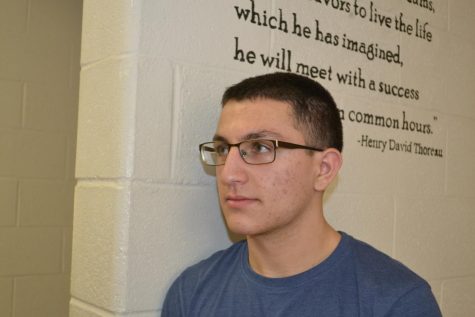OPINION: Students should value being happy over well-roundedness
June 12, 2017
Intended to operate as a bridge between scholastic ambition and outside-of-the-classroom application, the idea of “well-roundedness”—the Wire found—is, for many students, emblematic of inauthentic education rather than a means of achieving academic and
extracurricular balance.
While West Essex stresses the importance of student-driven ambition, a number of students speaking on the matter said they often felt torn between pursuing a passion and making enrollment choices that might appear more beneficial on a college application.
Though classifications vary, well-rounded students typically participate in a collection of in and out-of-school activities meant to demonstrate competency, ability and dedication throughout differentiated disciplines.
Although these terms are often mutually agreed upon, controversy persists regarding their application. Frequently, students say, chasing the esteem of being well-rounded morphs into a pursuit of artificial interests struggling to meet the precepts of an ideal college applicant.
Guidance counselors Ms. Van Syckle and Ms. Cherny both said that students should not feel pressured to take courses purely to bolster a college application. “We don’t promote ‘looks good on your resume,’ ” Ms. Van Syckle said. Well-roundedness, she noted, is more about finding balance than meeting expectations.
“Somebody else’s expectations are out of your control,” Ms. VanSyckle said.
Ms. Cherny echoed the importance of that balance, saying that she does not want students “to be somebody else.” “[The guidance department helps] students embrace their interests,” she said. “Don’t do it because you should do it; do it because you want to do it.”
Many students said, however, that the drive to pursue what is important to them is often marred by an educational culture that nurtures outcome over experience. Junior Samantha Luk said she ended up in a senior physics class solely for its implications on her college application. “If I didn’t take physics, I could have taken something that I really wanted like AP music theory or forensic science—I have wanted to do that since middle school,” Luk said.
“High school is a time where you’re supposed to venture out and explore what you love,” Luk said. When it comes to scheduling, however, Luk said there is often pressure to give precedence to classes that are said to read well on college resumes.
That stream of thought—abandoning personal interests in favor of practicality—was prevalent among many other students. Junior Sara Kalb said that while “we shouldn’t have to” cede passions for the purpose of academic eligibility, “in reality, we need to.”
In an educational landscape defined by grade point averages and test scores, students find it challenging to establish when embracing those interests is advantageous and when those interests might be placing them at a disadvantage.
When asked about the burden and stress of achieving the dubious balance between academia and extracurriculars, Ms. Van Syckle suggested that pressure comes from exterior forces or self-imposed expectations rather than from the actions or tendencies of the school.
“I hope that doesn’t come from us,” Ms. Van Syckle said.
Furthermore, both Ms. Van Syckle and Ms. Cherny emphasized the consequential role academics play in the college application process. Ms. Van Syckle noted that academic performance can contribute to 75 percent of an admission decision and Ms. Cherny stressed the importance of creating a “robust resume.”
The terms of this balance can, quite honestly, feel nearly impossible to achieve. The duplicity of well-roundedness—mandating academic and individualistic achievement in congruence—creates a dizzying haze of expectations. If it is possible for college preparedness and the pursuit of a passion to happily coexist among the confines of curricula, that message is certainly getting lost. “Individuality is pretty hard to
achieve when you’re hyper aware of the expectations of prestigious schools,” Kalb said.
While the origin of this expectational failure remains in contest, the psyche of the student
body does not. Many students still feel constrained by the edicts of resume-building, and some find themselves fighting a losing war of passion against practicality. “If you forget that you’re a college applicant first, and a person second, you’re already behind,” Kalb said.
Although West Essex’s socioeconomic climate favors high expectations, those expectations must be tamed with realistic standards for success. The pinnacle of the well-rounded student may very well be a beacon of achievement and ability, but it is unavailing if it obscures the opportunity to embrace personal strengths.
Opportunity, Ms. Van Syckle said, must always be informed. The school provides choice, but guides students in a direction that is most advantageous for them. “Everyone should have the choice; not everyone should choose it,” Ms. Van Syckle said.
While fostering practicality is undeniably the role of schools, tonal improvements are needed when it comes to bridging the gap between personal happiness and the expectations of others. Practicality should not have to usurp passion.

